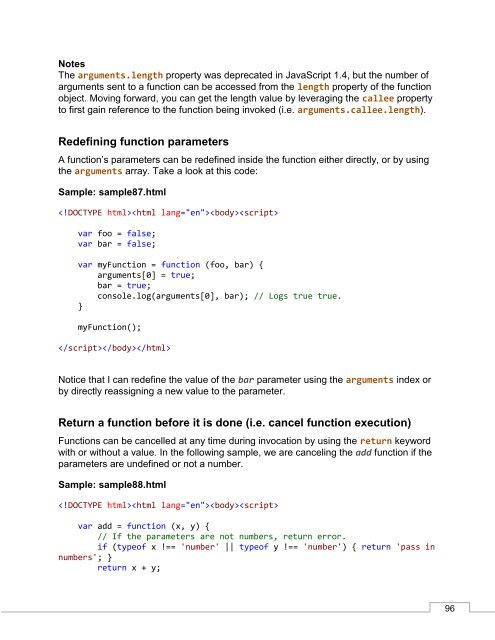JavaScript_Succinctly
Create successful ePaper yourself
Turn your PDF publications into a flip-book with our unique Google optimized e-Paper software.
Notes<br />
The arguments.length property was deprecated in <strong>JavaScript</strong> 1.4, but the number of<br />
arguments sent to a function can be accessed from the length property of the function<br />
object. Moving forward, you can get the length value by leveraging the callee property<br />
to first gain reference to the function being invoked (i.e. arguments.callee.length).<br />
Redefining function parameters<br />
A function’s parameters can be redefined inside the function either directly, or by using<br />
the arguments array. Take a look at this code:<br />
Sample: sample87.html<br />
<br />
var foo = false;<br />
var bar = false;<br />
var myFunction = function (foo, bar) {<br />
arguments[0] = true;<br />
bar = true;<br />
console.log(arguments[0], bar); // Logs true true.<br />
}<br />
myFunction();<br />
<br />
Notice that I can redefine the value of the bar parameter using the arguments index or<br />
by directly reassigning a new value to the parameter.<br />
Return a function before it is done (i.e. cancel function execution)<br />
Functions can be cancelled at any time during invocation by using the return keyword<br />
with or without a value. In the following sample, we are canceling the add function if the<br />
parameters are undefined or not a number.<br />
Sample: sample88.html<br />
<br />
var add = function (x, y) {<br />
// If the parameters are not numbers, return error.<br />
if (typeof x !== 'number' || typeof y !== 'number') { return 'pass in<br />
numbers'; }<br />
return x + y;<br />
96



